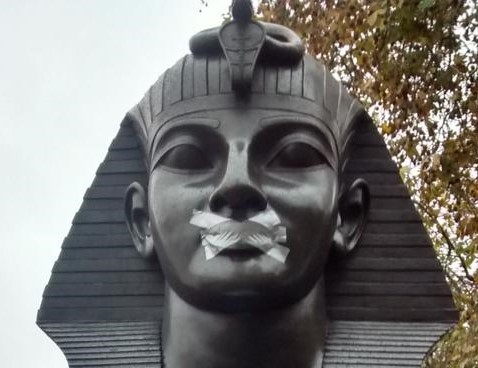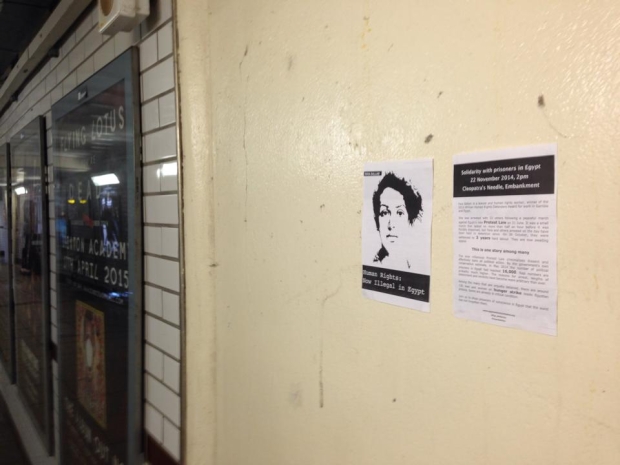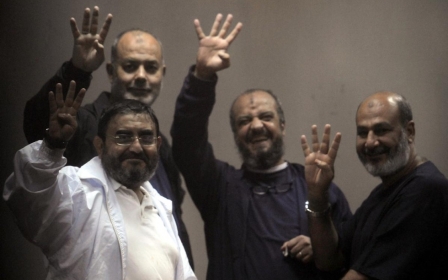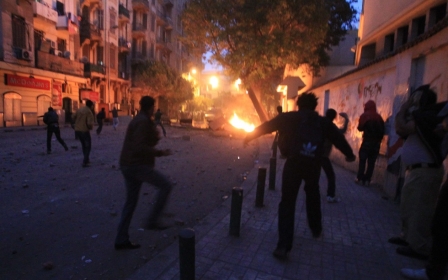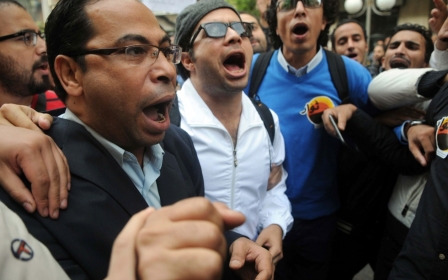Egypt's protest law sparks demonstration in London
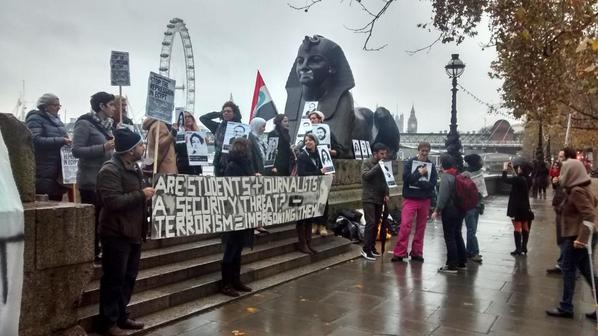
Activists gathered in central London Saturday to demonstrate against Egypt’s protest law and to show solidarity with the tens of thousands of prisoners detained under the controversial legislation.
The demonstration, organised by UK-based campaign group Egypt Solidarity, saw activists tape up the mouth of one of the city’s iconic sphinx statues “guarding” an ancient Egyptian obelisk on Victoria Embankment, near the Houses of Parliament.
"We wanted to demonstrate in a site that is connected to Egypt but is also visible to the public, to raise awareness in the UK that a movement in Egypt is being repressed," protest organiser Anne Alexander told MEE.
Ahead of the protest, which was held in light afternoon rain, activists bedecked walls around London with posters bearing the image of Yara Sallam, a lawyer and human rights campaigner jailed for three years on 26 October for breaching the protest law in June last year.
The contentious legislation, introduced last November, bans any protest that takes place without prior police notification.
The law also allows police to use force, including rubber bullets and shotguns, against peaceful protesters suspected of committing "any crime punishable by law."
The law is opposed by rights groups and campaigners within Egypt, and many of those who have taken to the streets in Egypt in protest against it have ultimately been arrested under the legislation.
(Footage courtesy of Egypt Solidarity Initiative)
Many of those detained have undertaken hunger strikes in prison.
Some have now been refusing food for 150 days or more, and activists in the outside world have joined the hunger strike in solidarity.
“We are protesting in solidarity with the political prisoners and human rights activists who are on hunger strike,” another organiser of the London protest, Sherif Azer, told MEE by phone on Saturday.
“We are also here to demand the abolition of the protest law. The legislation is illegal, because it was issued in the absence of the constitution.
“Additionally, the content of the law contains many provisions that breach international law and even Egyptian law - for example, it allows the use of live ammunition against protesters.
“It also violates the right to peaceful protest, as stipulated international law.”
The group called on Egypt’s forthcoming parliament, to be selected by March 2015, to put a review of the protest law at the top of its agenda.
Thanks to the protest law, Azer said, it has become near impossible to demonstrate freely within Egypt, increasing the importance of international solidarity.
“Protesting abroad has become much more possible and much more effective," he said.
On Saturday, the demonstrators urgently called on the British government to take action on Egyptian human rights.
"The government should welcome Egyptian refugees, who are fleeing from a dictatorship, with open arms," Alexander said. "But looking at the UK's record on accepting political asylum seekers from allies like Bahrain, some of whose claims were refused even though they were torture survivors, I am not optimistic."
Alexander also urged the UK to halt its support, both explicit and implicit, for Egypt's current government.
"The UK has offered enormous amounts of material support, through things like arms sales, to back up the activities of the Egyptian government on the ground.
"But is also tacitly supports the government - the UK's recent investigation into the Muslim Brotherhood, for instance, is likely the result of pressure from the Egyptian government."
The protest in London comes just over two weeks after the US publicly slammed Egypt's human rights record, following an international review in Geneva.
The US, a key ally that provides Egypt with development and military aid, including the controversial sale of Apache helicopters, had previously been criticised for its silence over the law, described by rights groups as posing a “grave threat” to freedoms in the country.
Middle East Eye propose une couverture et une analyse indépendantes et incomparables du Moyen-Orient, de l’Afrique du Nord et d’autres régions du monde. Pour en savoir plus sur la reprise de ce contenu et les frais qui s’appliquent, veuillez remplir ce formulaire [en anglais]. Pour en savoir plus sur MEE, cliquez ici [en anglais].


